Positive Daily Affirmations: Is There Science Behind It?
 Self-help books often promote the power of positive daily affirmations.
Self-help books often promote the power of positive daily affirmations.
You, me, and almost everybody in the 21st century have heard of them. But if you’ve never tried them before, the idea can seem incredibly awkward.
Telling yourself how awesome you are can seem bizarre, but if that’s all you’re doing, there are probably more effective ways to go about it. And if you’re a skeptic, it doesn’t hurt to understand how and why positive affirmations became so popular.
And yes, there is genuine theory and a fair amount of neuroscience behind this practice. Let’s have a look!
Before you read on, we thought you might like to download our three Mindfulness Exercises for free. These science-based, comprehensive exercises will not only help you cultivate a sense of inner peace throughout your daily life but will also give you the tools to enhance the mindfulness of your clients, students or employees.
This Article Contains:
- What Are Positive Affirmations? A Definition
- Is There Science Behind Them?
- A Look at the Research
- Benefits of Daily Affirmations
- Who Is Louise Hay?
- Questions Asked About Affirmations
- Positive Affirmation Examples
- Positive Affirmation Cards
- Recommended Apps
- Positive Morning Affirmations
- Positive Affirmation Meditations
- 3 Positive Affirmations in Audio
- Recommended Books
- 4 YouTube Videos Worth Watching
- 5 Quotes
- A Take-Home Message
- References
What are Positive Affirmations? A Definition
Fortunately, positive affirmations are almost as easy to define as they are to practice. Put simply, they are positive phrases or statements used to challenge negative or unhelpful thoughts.
Practicing positive affirmations can be extremely simple, and all you need to do is pick a phrase and repeat it to yourself.
You may choose to use positive affirmations to motivate yourself, encourage positive changes in your life, or boost your self-esteem. If you frequently find yourself getting caught up in negative self-talk, positive affirmations can be used to combat these often subconscious patterns and replace them with more adaptive narratives.
Is There Science Behind Them?

Positive affirmations require regular practice if you want to make lasting, long-term changes to the ways that you think and feel. The good news is that the practice and popularity of positive affirmations are based on widely accepted and well-established psychological theory.
The Psychological Theory Behind Positive Affirmations
One of the key psychological theories behind positive affirmations is self-affirmation theory (Steele, 1988). So, yes, there are empirical studies based on the idea that we can maintain our sense of self-integrity by telling ourselves (or affirming) what we believe in positive ways.
Very briefly, self-integrity relates to our global self-efficacy—our perceived ability to control moral outcomes and respond flexibly when our self-concept is threatened (Cohen & Sherman, 2014). So, we as humans are motivated to protect ourselves from these threats by maintaining our self-integrity.
Self-Identity and Self-Affirmation
Self-affirmation theory has three key ideas underpinning it. They are worth having in mind if we are to understand how positive affirmations work according to the theory.
First, through self-affirmation, we keep up a global narrative about ourselves. In this narrative, we are flexible, moral, and capable of adapting to different circumstances. This makes up our self-identity (Cohen & Sherman, 2014).
Self-identity (which we’re seeking to maintain, as mentioned before) is not the same as having a rigid and strictly defined self-concept. Instead of viewing ourselves in one “fixed” way, say as a “student” or a “son”, our self-identity can be flexible. We can see ourselves as adopting a range of different identities and roles. This means we can define success in different ways, too.
Why is this a good thing? Because it means we can view different aspects of ourselves as being positive and can adapt to different situations much better (Aronson, 1969).
Secondly, self-affirmation theory argues that maintaining self-identity is not about being exceptional, perfect, or excellent (Cohen & Sherman, 2014). Rather, we just need to be competent and adequate in different areas that we personally value in order to be moral, flexible, and good (Steele, 1988).
Lastly, we maintain self-integrity by acting in ways that authentically merit acknowledgment and praise. In terms of positive affirmations, we don’t say something like “I am a responsible godmother” because we want to receive that praise. We say it because we want to deserve that praise for acting in ways that are consistent with that particular personal value.
A Look at the Research
The development of self-affirmation theory has led to neuroscientific research aimed at investigating whether we can see any changes in the brain when we self-affirm in positive ways.
There is MRI evidence suggesting that certain neural pathways are increased when people practice self-affirmation tasks (Cascio et al., 2016). If you want to be super specific, the ventromedial prefrontal cortex—involved in positive valuation and self-related information processing—becomes more active when we consider our personal values (Falk et al., 2015; Cascio et al., 2016).
The results of a study by Falk and colleagues suggest that when we choose to practice positive affirmations, we’re better able to view “otherwise-threatening information as more self-relevant and valuable” (2015: 1979). As we’ll see in a moment, this can have several benefits because it relates to how we process information about ourselves.
Benefits of Daily Affirmations

- Self-affirmations have been shown to decrease health-deteriorating stress (Sherman et al., 2009; Critcher & Dunning, 2015);
- Self-affirmations have been used effectively in interventions that led people to increase their physical behavior (Cooke et al., 2014);
- They may help us to perceive otherwise “threatening” messages with less resistance, including interventions (Logel & Cohen, 2012);
- They can make us less likely to dismiss harmful health messages, responding instead with the intention to change for the better (Harris et al., 2007) and to eat more fruit and vegetables (Epton & Harris, 2008);
- They have been linked positively to academic achievement by mitigating GPA decline in students who feel left out at college (Layous et al., 2017);
- Self-affirmation has been demonstrated to lower stress and rumination (Koole et al., 1999; Wiesenfeld et al., 2001).
If you’re interested in finding out more about the proven benefits of practicing positive affirmations, this article by Critcher and Dunning (2015) is worth a read. The article looks at the ways in which practicing affirmations has been shown to foster a broader sense of self-concept.
What Are the Health Benefits?
As the studies above suggest, positive affirmations can help us to respond in a less defensive and resistant way when we’re presented with threats. One study that was mentioned above showed that smokers reacted less dismissively to graphic cigarette packet warnings and reported intention to change their behavior (Harris et al., 2007).
But more generally, an adaptive, broad sense of self makes us more resilient to difficulties when they arise. Whether it’s social pressures, health information that makes us feel uncomfortable, or feelings of exclusion, a broader self-concept can be an extremely helpful thing to have.
Can They Help One’s Outlook on Life?
As inherently positive statements, affirmations are designed to encourage an optimistic mindset. And optimism in itself is a powerful thing. In terms of reducing negative thoughts, affirmations have been shown to help with the tendency to linger on negative experiences (Wiesenfeld et al., 2001).
When we are able to deal with negative messages and replace them with positive statements, we can construct more adaptive, hopeful narratives about who we are and what we can accomplish.
What Is Healing Affirmation?
This kind of affirmation is a positive statement about your physical well-being. Popularized by author and speaker Louise Hay, these affirmations are based on the idea that your thoughts can influence your health for the better. You don’t have to be unwell to practice healing affirmations; this idea can be just as helpful for healing emotional pain if you find the idea rings with you.
Examples from Hay’s website include:
“My happy thoughts help create my healthy body,”
and
“Wellness is the natural state of my body. I am in perfect health.”
Who is Louise Hay?
Louise Hay, mentioned above, was an author, teacher, and lecturer who was well-known for her 1984 internationally bestselling book You Can Heal Your Life. Born in the U.S., Hay survived many difficult experiences, including abuse and domestic violence, before she established the First Church of Religious Science.
In the 1970s, Hay was diagnosed with what medical professionals called irreversible cervical cancer, and as a result, she began looking into non-medical healing alternatives. In doing so, she created an approach that combined visualization, forgiveness, psychotherapy, and dietary health.
In later interviews—Hay lived to the age of ninety—she shared how she believed that this was what led to her being cured within half a year of her diagnosis.
Hay argued that self-perspectives and other negative beliefs are often the causes of our health problems. Through affirmations and other alternative approaches like positive thinking, she argued, we have the power to transform our lives and health.
You may have seen Hay on Oprah, or you may have read one of her books, in which you can learn more about the techniques, practices, and affirmations that explain her beliefs.
Positive affirmations are positively loaded phrases, or statements that are used to challenge unhelpful or negative thoughts. People can use positive affirmations to motivate them, encourage positive changes in their life, or boost their self-esteem. It sounds simple, and quite frankly, it is!
Positive affirmations are rooted in the self-affirmation theory (Steele, 1988), which states that humans are motivated to protect themselves from threats by painting self-integrity (for which we need overall flexibility).
According to research on the self-affirmation theory, there is MRI evidence that suggests that certain neural pathways are increased when people practice self-affirmation tasks, such as repeating positive affirmations daily (Cascio et al., 2016).
Additionally, self-affirmations have been found to decrease health-deteriorating stress and linked positively to academic achievement (Sherman et al., 2009; Layous et al., 2017).
We are not trying to say that repeatedly telling yourself these positive affirmations will magically make your anxiety disappear. However, regular practice and consistency can change the way you see yourself and your anxiety in the longer term. It is a very minimal effort practice with powerful benefits.
Answers to Common Questions About Affirmations
If you haven’t practiced positive affirmations before, you might have a lot of questions at this point. Here, we’ll address some of the most common questions asked about the topic.
Are Self-Affirmations Best Said Every Day?
There are no hard and fast rules about timing or frequency when it comes to practicing self-affirmations.
According to psychotherapist Ronald Alexander of the Open Mind Training Institute, affirmations can be repeated up to three to five times daily to reinforce the positive belief. He suggests that writing your affirmations down in a journal and practicing them in the mirror is a good method for making them more powerful and effective (Alexander, 2011).
Can They Help with Anxiety and Depression?
Positive affirmations are not designed to be cures for anxiety or depression, nor are they a substitute for clinical treatment of those conditions. But that’s not to say that they won’t help.
The idea of affirmations as a means of introducing new and adaptive cognitive processes is very much the underlying premise of cognitive restructuring. This is supported by a study of cancer patients that suggests that spontaneous self-affirmation had a significantly positive correlation to feelings of hopefulness (Taber et al., 2016).
Will They Boost Self-Esteem?
Affirmations can sometimes be very useful for boosting your self-esteem—but there’s a caveat.
The most important thing, according to self-affirmation theory, is that your affirmations reflect your core personal values (Cohen & Sherman, 2014). There is little point in repeating something arbitrary to yourself if it doesn’t gel with your own sense of what you believe to be good, moral, and worthwhile.
To have any kind of impact on your self-esteem, your self-affirmations should be positively focused and targeted at actions you can take to reinforce your sense of self-identity. Use your real strengths, or strengths that you consider important, to guide your affirmations.
Can You Improve Sleep With Affirmations?
A large number of anxiety-sufferers experience disturbed sleep (Staner, 2003). In the sense that affirmations can sometimes help to relieve anxiety, they may have some beneficial effects in promoting better sleep.
In addition, incorporating your affirmations into meditation can be relaxing and soothing. Meditation has been found to have numerous benefits in terms of sleep quality, so positive affirmation meditation could very well be a good way to improve your sleep (Nagendra et al., 2012).
If you are interested in trying this, you’ll find some audio and video below that may be helpful.
Are They Just Positive Mantras?
If you start digging into the academic literature, you’ll find that the terms “affirmation” and “mantra” are regularly used interchangeably. The same goes for more colloquial uses of the terms. There is a difference, though.
Technically, mantras are sacred words, sounds, or verses that carry more spiritual meaning than affirmations (Encyclopedia Britannica, 2019). Frequently said aloud or mentally, they are believed to have deep significance and they feature a lot in meditation. More specifically, according to Encyclopedia Britannica (2019):
“Most mantras are without any apparent verbal meaning, but they are thought to have a profound underlying significance and are in effect distillations of spiritual wisdom.”
Positive affirmations, in contrast, are described by the Psychology Dictionary as brief phrases, repeated frequently, which are designed to encourage positive, happy feelings, thoughts, and attitudes. They hold no spiritual or religious meaning in the traditional sense and can be used for many purposes.
Positive Affirmation Examples

- I believe in myself, and trust my own wisdom;
- I am a successful person;
- I am confident and capable at what I do.
Listed below are more positive affirmation examples, focused on specific areas.
9 Positive Affirmations for Women
Looking for some ideas to create your own affirmations? Here are some nice examples:
- I choose to be happy;
- My life is taking place right here, right now;
- I’m gifted with and surrounded by amazing friends and family;
- I opt to rise above negative feelings and ditch negative thoughts;
- I am resilient, strong, and brave, and I can’t be destroyed;
- Nobody but me decides how I feel;
- When I lie down to sleep, everything is as it should be, and I rest content;
- I am in charge of my thoughts, and I don’t judge myself;
- I accept and love myself, thoroughly and completely.
These are adapted from a bigger list of 110 affirmations, written by certified self-development coach Barrie Davenport.
9 Positive Affirmations for Men
Here are some affirmations for men, including affirmations of self-acceptance and positive body image. These affirmations are based on a larger list of 30 affirmations and were adapted using the cognitive behavioral therapy idea of “negative core beliefs.”
- I am responsible for looking after me;
- By being myself, I bring happiness to other people;
- My goals and desires are as worthwhile as everybody else’s;
- Through courage and hard work, I can achieve anything that I set my mind to;
- I’m fine with who I am, and I love who I am becoming;
- Through my contributions, I make positive changes to the world;
- My body is amazing just the way it is, and I accept myself this way;
- I choose only to surround myself with supportive and good people;
- Whenever I fall down, I get back up again.
15 Positive Affirmations for Teens
Social pressures and academic stresses can take their toll on teens, but they can turn around negative self-talk and do something positive about they think and feel. Here are some affirmations that are well-suited for teenagers:
- I am a quick, capable learner;
- I believe in myself as a person and I believe in all my capabilities;
- I am unique and beautiful;
- Others respect me for following my own beliefs;
- If a few people don’t accept me, I’m fine with that;
- I forgive others for sometimes doing the wrong thing, and I forgive myself when I do the same;
- I am kind and good to the person I see in the mirror;
- I deserve to see myself as amazing;
- Whatever difficulties come my way, I have the power to overcome them;
- I was born strong, and I grow stronger every day;
- Today, I am going to trust myself and my instincts;
- I am good enough, and I am fine with just being me.;
- I treat others with respect, and they treat me the same;
- I choose to rise above the hurtful things that might come my way;
- I am working every day on the best me that I can be.
These positive affirmations for teens are inspired by this article from the Positive Affirmations Center, and this video by Jason Stephenson. (The video is highlighted again later in the article.)
11 Positive Affirmations for Kids
By learning to practice positive affirmations at a young age, kids can become much more prepared to use them when facing difficulties later in life (Bloch, 2015). These are very simple affirmations because the easier they are for young kids to remember, the more likely children will be able to practice them without an adult’s help.
- I am loved;
- I am creative;
- I am kind;
- I am brave;
- I am a responsible person;
- I will always do my best;
- I am unique;
- When I set out to do something, I am capable of doing it;
- I’ll always help others;
- I’m going to learn lots today because I am capable;
- I am important and a valuable person.
Similar affirmations for kids can be found at The Teacher Toolkit.
Everyday Positive Affirmations for Students
Students may find that affirmations are helpful for coping with the stress of academic life as well as their extracurricular and social lives. Here are some examples you or a student can use for motivation or inspiration.
- When I get a bad grade, I am motivated to do better;
- I am determined and I aim for the stars;
- I set high standards for my academic achievement. By putting in time and effort, I can accomplish what I set out to achieve;
- I appreciate my school, teachers, and classmates because they all play a role in helping me grow to be a better person;
- Even on days when I don’t make much progress, I am constantly learning. On other days, I make amazing progress toward my goals.
9 Positive Affirmations to Help Relieve Anxiety
Most people who have suffered from anxiety will likely know how important it can be to cut off negative thought patterns before they begin to spiral. These affirmations can be used at any time, and even those who don’t typically feel anxious may find them useful during stressful moments.
During times of anxiety or depression, this list of 72 positive affirmations can be used for reassuring yourself. A few examples inspired by this resource include:
- I am liberating myself from fear, judgment, and doubt;
- I choose only to think good thoughts;
- My anxiety does not control my life. I do.
Some other affirmations related to nonjudgment and mindfulness for anxiety:
- I breathe, I am collected, and I am calm;
- I am safe, and everything is good in my world;
- Inside me, I feel calm, and nobody can disturb this peacefulness.
More affirmations were found at Anxiety Gone. Here are some based on these principles:
- I recognize that my negative thoughts are irrational, and I am now going to stop these fears;
- This is just one moment in time;
- I’m not going to be scared by a feeling.
While practicing these affirmations, try to take deep, slow, soothing breaths. As you become more attuned to the flow of your breath in and out, try not to let your feelings distract you. Focus on the affirmation that you’ve put time into creating for yourself, and each time you practice, it will feel more natural.
5 Daily Affirmations for Depression
As with anxiety, depression is often linked closely to—if not underpinned significantly by—thought processes such as overgeneralization and cognitive distortions (Beck, 1964).
Selective abstraction is a common distortion that is associated with depression and describes the tendency to overexaggerate negative things while underemphasizing the positive. Affirmations can help us to try and correct this balance by acknowledging and focusing on more positive aspects of both ourselves and our lives.
Here are 5 daily affirmations you can adapt, as we have. You can also view them at their original source.
- I am not afraid to keep going, and I believe in myself;
- I have come this far, and I am proud of myself;
- This is just one moment in my life, and it does not define who I am;
- This is one isolated moment, not my entire life. Things will get better;
- These are just thoughts. Only I determine the way I choose to feel.
5 Positive Affirmations to Help Build Self-Esteem
Here are five positive affirmations that are designed to help you increase your self-esteem:
- I release negative feelings and thoughts about myself;
- I always see the best in others;
- I believe in who I am;
- I am on a journey, ever growing and developing;
- I am consistent in the things that I say and do.
These affirmations were adapted from quotes written by coach and trainer Caroline Rushforth.
Words of Affirmation to Use During Pregnancy
If you are expecting, here are some suggestions from midwife, reflexologist, and practicing nurse Marie Drake Boyle. These can even be useful during labor, she says.
- My baby is secure, loved, and safe;
- My baby is going to be healthy and at the best time for us;
- I trust my instincts and my body to tell me what I need when I am giving birth;
- Strong, healthy, good contractions will guide my baby into this world;
- I am relaxed, and my baby is going to be born easily.
Using Positive Affirmations at Work
Just like you can practice mindfulness in a quiet moment at work, there’s no reason not to take some time out to practice your affirmations at your desk.
Some examples might include:
- I do not need to rely on others judgment for acceptance;
- I do my very best, and that’s great;
- I am resilient and can handle problems with expertise.
Positive Affirmation Cards
If you find that writing down your positive affirmations is helpful, or you want to carry them around with you throughout your day, why not make your own positive affirmation cards?
A quick internet search will reveal an abundance of these products, but all you really need is your own affirmations, a piece of paper or notecard, scissors and a pen. Quite simply, affirmation cards are pieces of paper about the size of a credit card that you can pop into your wallet, bag, or pocket that can be useful as a little reminder when you’re on the move.
Recommended Apps
If you’re after an app that can whip up a positive affirmation for you, here are some great examples.
1. ThinkUp
ThinkUp is an app featuring affirmations that are personally used by dozens of notable people, including coaches, athletes, authors, and more. If it seems difficult at first to think of a meaningful set of affirmations, this is a great source of inspiration.
2. Shine
Prefer to receive your affirmations via uplifting SMS messages? Try Shine. When you sign up on its website, Shine will send you one text each weekday. Shine claims that 93% of its users have reported noticeable improvements in their happiness each day.
3. Unique Daily Affirmations
It’s as simple as one unique positive affirmation each day with this app, which you can either visit daily to see the affirmation, or you can set it up to send you push notifications. In addition, Unique Daily Affirmations has a nice feature in which you can record your own affirmations and upload your own photos to make it more “you.”
Positive Morning Affirmations

According to Louise Hay, affirmations and positive thinking expert, the morning is a great opportunity to practice mirror work, in which you recite affirmations while looking at yourself in the mirror.
And the morning, Hay believes, is the best time to determine how you want the rest of the day to go. It’s why positive morning affirmations can be very powerful—and a great opportunity to practice repeating them in the mirror. Here are some of her suggestions:
- I am beautiful and everybody loves me;
- Life brings me only good experiences. I am open to new and wonderful changes;
- I feel glorious, dynamic energy. I am active and alive;
- Every experience I have is perfect for my growth;
- Today I create a wonderful day and a wonderful new future;
- Abundance flows freely through me;
- My self-esteem is high because I honor who I am.
These examples are from author Hay’s website.
Some general sentences that you can use to create your own positive morning affirmations include:
- Each day, I am growing stronger;
- Today, I am going to tackle everything bravely and with confidence;
- I am in charge of how I live each day.
What works for one person isn’t always going to work for the next. If you are having difficulty coming up with your own affirmations, try to think of a value that you would like to become part of your personal narrative. If it helps, you can scroll back up to where we talked about self-affirmation theory (under the heading “Is There Science Behind It?”) and use those principles to guide you.
Positive Affirmation Meditations
You don’t have to limit yourself to repeating your affirmations subconsciously or aloud. You can use these to guide a meditation session while you reflect on what you say to yourself each day.
How, where, and why you might want to practice meditation is a much larger discussion, but the relaxation benefits are widely acknowledged. Here are a few guided meditation videos that might help you relax and meditate on your positive affirmations.
1. Positive Thinking Meditation: Endorphin Meditation With Positive Affirmations
Linda Hall is a personal development coach and a meditation teacher. This video uses affirmations with positive thinking principles. It’s ten minutes long, so it’s quite nice for whenever you have a short moment to yourself.
2. Morning Meditation: 10 Minutes – Positive Affirmations to Start Your Day
This is a nice mix of affirmations that includes breathing techniques. As the title suggests, this video can be a short yet intensely relaxing and motivating way to start your day.
3. I AM Morning Affirmations: Gratitude, Self Love, Positive Energy, Freedom & Happiness
In a similar vein, this video includes affirmations of self-love, gratitude, and self-acceptance. Another resource to guide your morning meditation.
3 Positive Affirmations in Audio
If you’d rather listen to some affirmations on the go, or if your morning is way too hectic to set aside time for mirror work, affirmations in audio format are great solutions.
There are plenty of audio versions of positive affirmations out there, but we’ve selected three for you to try. Here are some audio tracks you can listen to while you’re out and about.
1. Rewire Your Brain: 300 Affirmations for Positive Thinking by Zhanna Hamilton (Audiobook)
This audiobook by Zhanna Hamilton (available on Amazon) is exactly what it sounds like, and it contains hundreds of affirmations that you can take with you while riding in the car, bus, or train, or wherever you go. These affirmations mirror the concepts we’ve described above, and you can use these positive narratives to develop more optimistic thought patterns.
2. Affirmations Audio by Calmer You
Here’s a free audio track that’s very basic. Great for if you don’t want music or anything fancy, this is a short track of affirmations read aloud that you download as a mp3. To download it, you have to scroll to the bottom of the Calmer You blog page.
3. Positive Affirmations by Anandra Rose
You can listen to this soft and gentle 33-minute track (available on Audible here) of motivational affirmations anywhere, including as you drift off to sleep. Straightforward and uplifting, this track can help you shift your attitude away from negative thoughts. You will have to subscribe to an Audible trial to get it.
Recommended Books
If you’re a reader and want to learn more, here are some nice books that you can order or download in whatever format suits you best.
1. You Can Heal Your Life – Louise Hay
Hay’s bestselling book is a great place to start if you want to learn more about healing affirmations and Hay’s life-changing experiences with positive thinking.
Available on Amazon.
2. You Can Do All Things: Drawings, Affirmations and Mindfulness to Help with Anxiety and Depression – Kate Allan
This is a gorgeous book of affirmations, drawings, and even mindfulness tips, all created to help those dealing with depression and anxiety.
Available on Amazon.
3. Affirmations: The Power of Affirmations & The Secret to Their Success – Louise Stapely
This lovely book contains more than 1000 affirmations that you can use as a jumping-off point on your own.
It also contains tips about how you can make your affirmation practice more effective.
Available on Amazon.
4 YouTube Videos Worth Watching
You may prefer audio rather than reading, and if so, you may find it super helpful to repeat the affirmations in some of these videos. Adding to their benefits? There’s so much scientific evidence to show that repeating things aloud makes for more effective learning.
1. POWERFUL 7 Minute Affirmations — Self Confidence for Teens
Just as negative thoughts can have huge power on the way we feel, so can positive ones. Even if these affirmations for teens aren’t your particular cup of tea, there are some lovely things in here that will definitely make you smile.
This video also has a large body of examples that you can use to create your own affirmations that are personally meaningful.
2. Self-Love Affirmations: “I am Beautiful” Affirm your Self Worth
This is a beautifully soothing video because it’s designed to aid sleep. Here are a few of the self-worth affirmations from the track:
- “I think positive thoughts about myself and others”;
- “I protect myself against any hurt that comes my way;
- “I like the person I see in the mirror”
3. Louise Hay – Your Own Healing
This video includes healing affirmations from Hay herself. This may be a particularly useful resource for those who are interested in her work, as she explains a lot about the relationship between our physical problems and our thoughts.
It explains the links between guilt, self-punishment, fear, and all the beautiful aspects of life that make Louise such an inspiring figure.
4. 33 Positive Affirmations for Kids [sic] Self Esteem
Simple, and well-suited for younger children, these affirmations are set to cheerful music. Uplifting, optimistic, and incredibly easy for kids to get into.
5 Quotes
If you still need more quotes to really motivate you, here are some of the best.
Take positive care of your mind, and it would surely take positive care of your life.
Edmond Mbiaka
I figured that if I said it enough, I would convince the world that I really was the greatest.
Muhammad Ali
You’ve been criticizing yourself for years and it hasn’t worked. Try approving of yourself and see what happens.
Louise Hay
If you want to change the way you feel about yourself, first you have to change the way you think about yourself.
Gavin Bird
We are each responsible for all of our experiences.
Louise Hay
A Take-Home Message
Positive affirmations can be a super refreshing way to use positive self-talk capable of reversing negative internal messages and motivating ourselves. Whether you’re seeking a means of coping with anxiety, want to get yourself pumped for something, or just want to be more optimistic in general, try coming up with your own affirmations
Do you have your own affirmations you’d like to share? Or, even better, how do you come up with your own affirmations? Share in the comments, we’d love to hear them!
We hope you enjoyed reading this article. Don’t forget to download our three Mindfulness Exercises for free.
- Alexander, R. (2011). 5 Steps To Make Affirmations Work For You. Retrieved from https://www.psychologytoday.com/us/blog/the-wise-open-mind/201108/5-steps-make-affirmations-work-you
- Aronson E. (1969). The theory of cognitive dissonance: a current perspective. In Berkowitz, L. (editor). Advances in Experimental Social Psychology. New York: Academic Press, 1–34.
- Beck, A. T. (1964). Thinking and depression: II. Theory and therapy. Archives of General Psychiatry, 10(6), 561-571.
- Bloch, D. (2015). Positive self-talk for children: Teaching self-esteem through affirmations. BookBaby.
- Cascio, C. N., O’Donnell, M. B., Tinney, F. J., Lieberman, M. D., Taylor, S. E., Strecher, V. J., & Falk, E. B. (2016). Self-affirmation activates brain systems associated with self-related processing and reward and is reinforced by future orientation. Social Cognitive and Affective Neuroscience, 11(4), 621-629.
- Cohen, G. L., & Sherman, D. K. (2014). The psychology of change: Self-affirmation and social psychological intervention. Annual Review of Psychology, 65, 333-371.
- Cooke, R., Trebaczyk, H., Harris, P., & Wright, A.J. (2014) Self-affirmation promotes physical activity. Journal of Sport and Exercise Psychology, 36(2), 217–223.
- Critcher, C. R., & Dunning, D. (2015). Self-affirmations provide a broader perspective on self-threat. Personality and Social Psychology Bulletin, 41(1), 3-18.
- Encyclopedia Britannica. (2019). Mantra. Retrieved from https://www.britannica.com/topic/mantra.
- Epton, T., & Harris, P. R. (2008). Self-affirmation promotes health behavior change. Health Psychology, 27(6), 746-752.
- Falk, E. B., O’Donnell, M. B., Cascio, C. N., Tinney, F., Kang, Y., Lieberman, M. D., … & Strecher, V. J. (2015). Self-affirmation alters the brain’s response to health messages and subsequent behavior change. Proceedings of the National Academy of Sciences, 112(7), 1977-1982.
- Harris, P. R., Mayle, K., Mabbott, L., & Napper, L. (2007). Self-affirmation reduces smokers’ defensiveness to graphic on-pack cigarette warning labels. Health Psychology, 26, 437–446.
- Koole, S.L., Smeets, K., van Knippenberg, A., Dijksterhuis, A. (1999). The cessation of rumination through self-affirmation. Journal of Personality and Social Psychology, 77, 111–125.
- Layous, K., Davis, E. M., Garcia, J., Purdie-Vaughns, V., Cook, J. E., & Cohen, G. L. (2017). Feeling left out, but affirmed: Protecting against the negative effects of low belonging in college. Journal of Experimental Social Psychology, 69, 227-231.
- Logel, C., & Cohen, G.L. (2012). The role of the self in physical health: Testing the effect of a values-affirmation intervention on weight loss. Psychological Science, 23(1), 53–55
LouiseHay.com. (2019). 101 Best Louise Hay Affirmations of All Time. Retrieved from https://www.louisehay.com/101-best-louise-hay-positive-affirmations/. - Nagendra, R. P., Maruthai, N., & Kutty, B. M. (2012). Meditation and its regulatory role on sleep. Frontiers in Neurology, 3, 54.
- Sherman, D. K., Cohen, G. L., Nelson, L. D., Nussbaum, A. D., Bunyan, D. P., & Garcia, J. (2009). Affirmed yet unaware: Exploring the role of awareness in the process of self-affirmation. Journal of Personality and Social Psychology, 97, 745-764.
- Staner, L. (2003). Sleep and anxiety disorders. Dialogues in clinical neuroscience, 5(3), 249.
- Steele, C. M. (1988). The psychology of self-affirmation: Sustaining the integrity of the self. Advances in Experimental Social Psychology, 21(2), 261-302.
- Taber, J. M., Klein, W. M., Ferrer, R. A., Kent, E. E., & Harris, P. R. (2015). Optimism and spontaneous self-affirmation are associated with lower likelihood of cognitive impairment and greater positive affect among cancer survivors. Annals of Behavioral Medicine, 50(2), 198-209.
- Wiesenfeld, B.M., Brockner, J., Petzall, B., Wolf, R., & Bailey J. (2001). Stress and coping among layoff survivors: A self-affirmation analysis. Anxiety, Stress and Coping: An International Journal, 14, 15–34.
- Worthman C.M., Plotsky, P.M., Schechter, D.S., & Cummings, C.A. (editors). (2010). Formative Experiences: The Interaction of Caregiving, Culture, and Developmental Psychobiology. New York: Cambridge Univ. Press
Let us know your thoughts
Read other articles by their category
- Body & Brain (50)
- Coaching & Application (57)
- Compassion (26)
- Counseling (51)
- Emotional Intelligence (24)
- Gratitude (18)
- Grief & Bereavement (21)
- Happiness & SWB (40)
- Meaning & Values (26)
- Meditation (20)
- Mindfulness (45)
- Motivation & Goals (45)
- Optimism & Mindset (34)
- Positive CBT (29)
- Positive Communication (20)
- Positive Education (47)
- Positive Emotions (33)
- Positive Leadership (18)
- Positive Parenting (4)
- Positive Psychology (33)
- Positive Workplace (37)
- Productivity (17)
- Relationships (46)
- Resilience & Coping (38)
- Self Awareness (21)
- Self Esteem (38)
- Strengths & Virtues (32)
- Stress & Burnout Prevention (34)
- Theory & Books (46)
- Therapy Exercises (37)
- Types of Therapy (64)
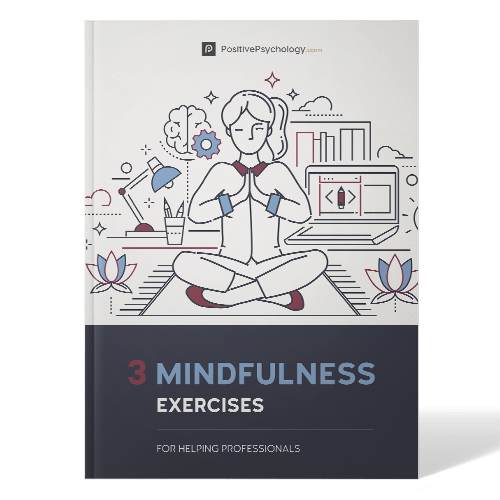
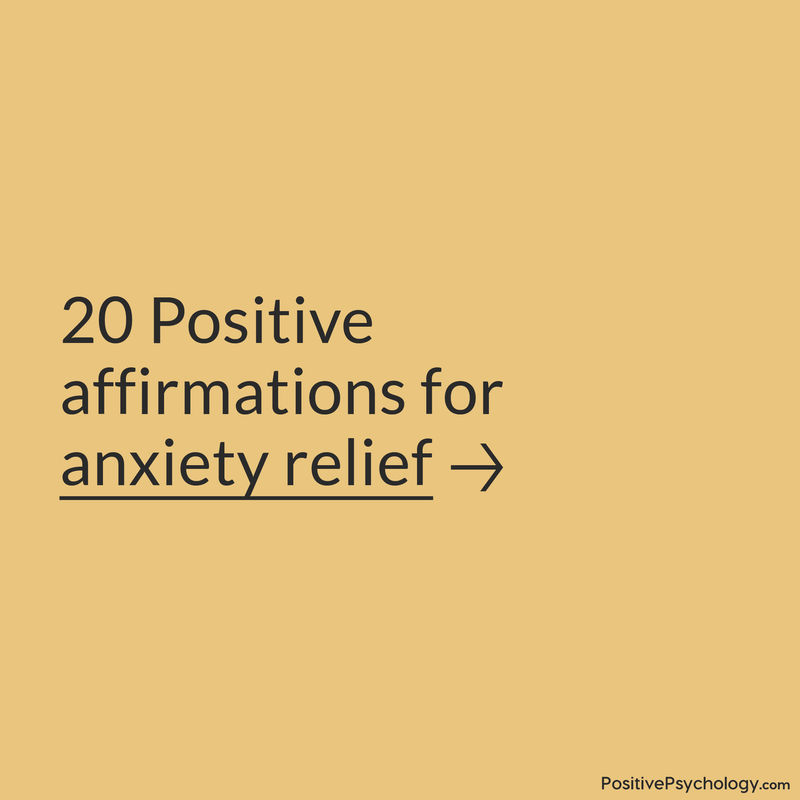
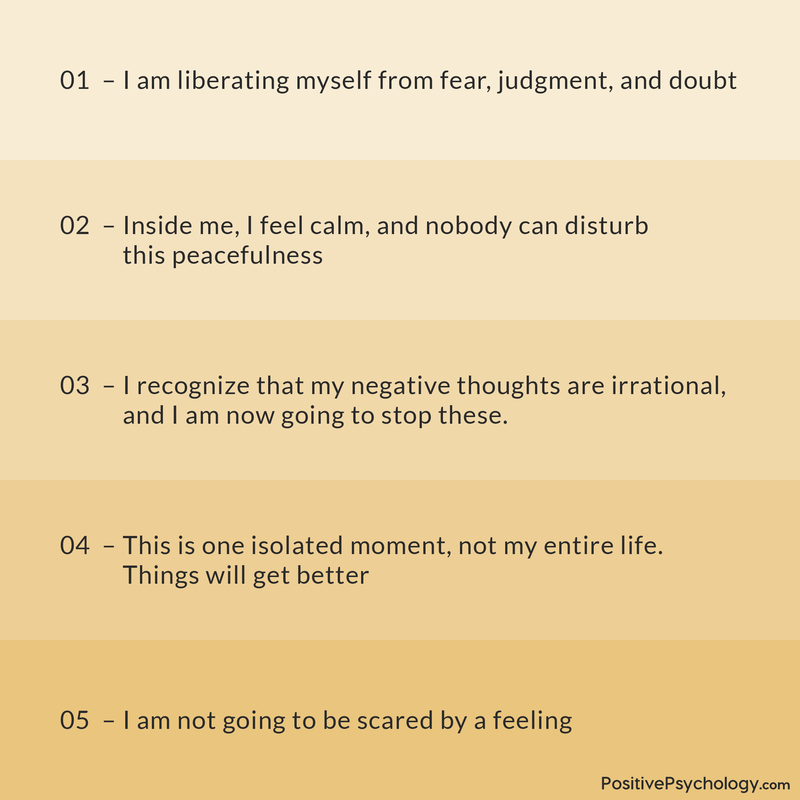
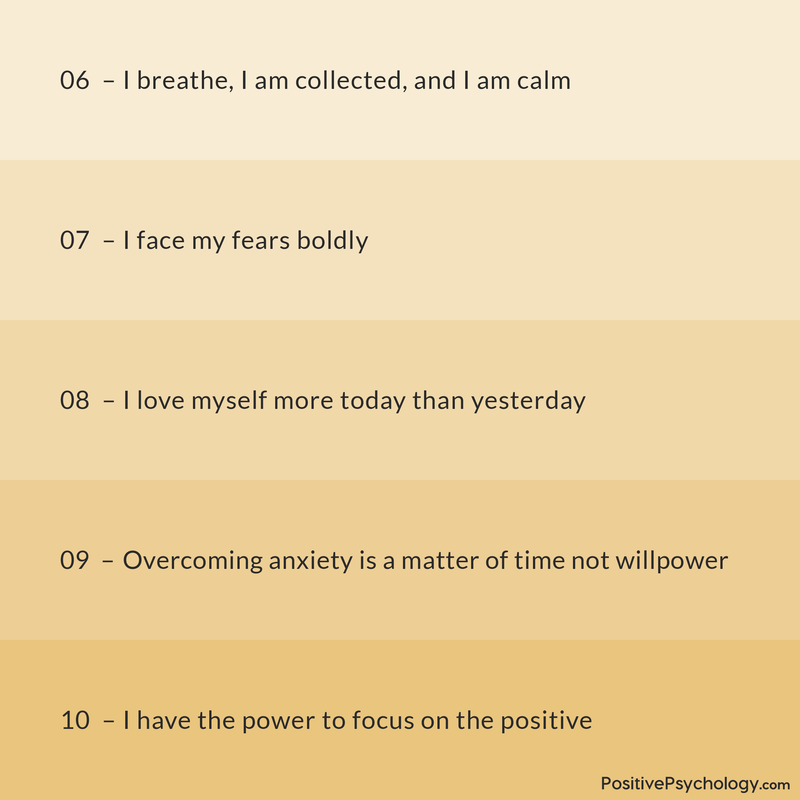
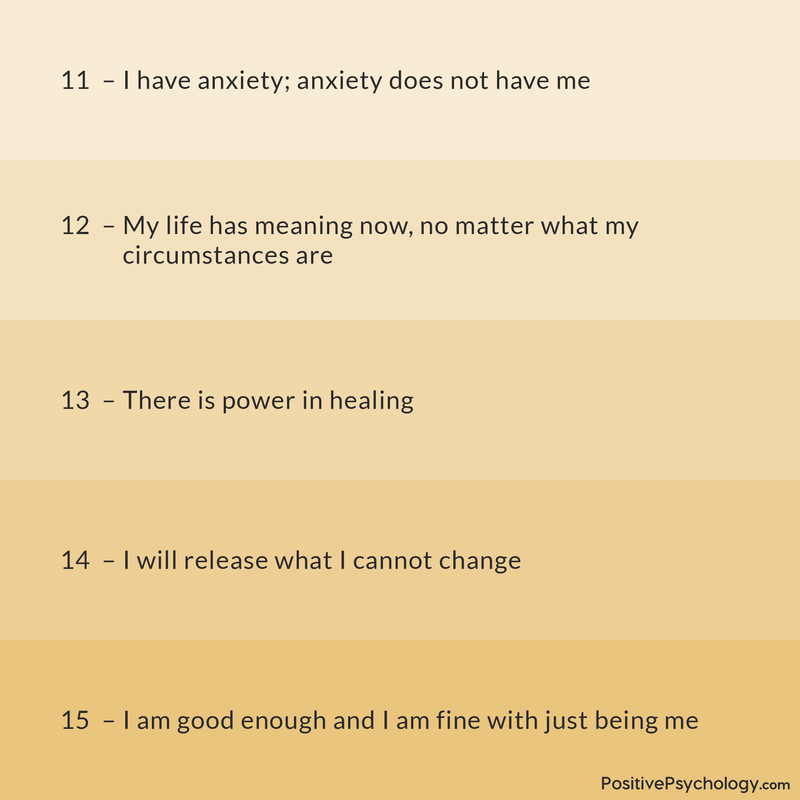
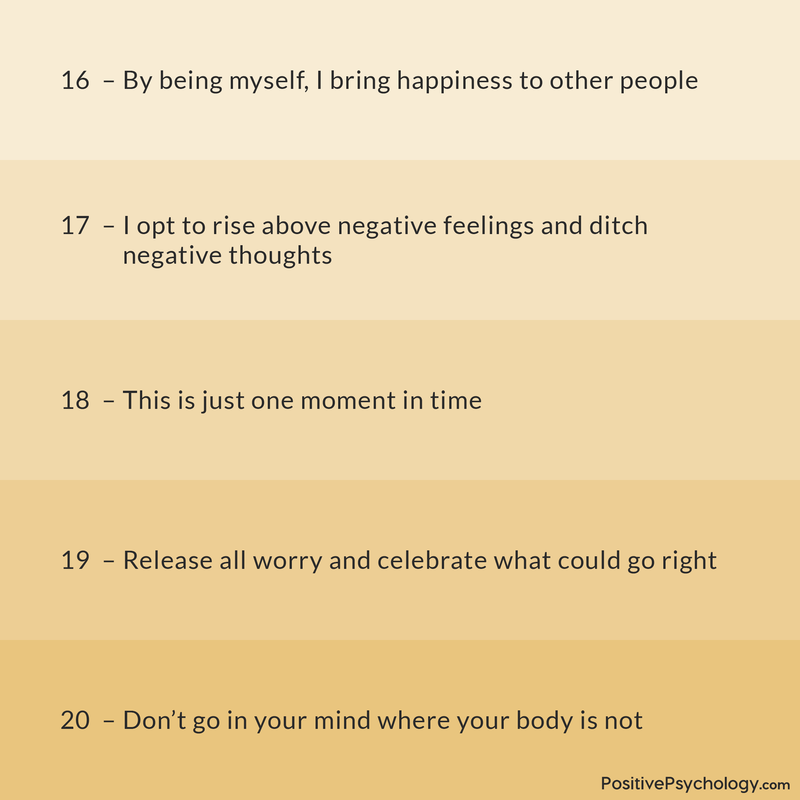
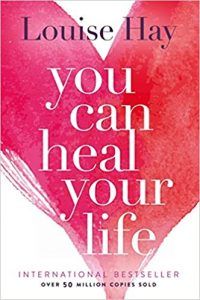
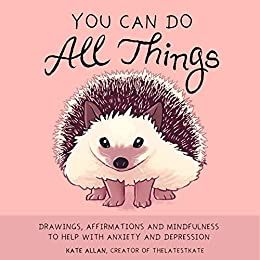

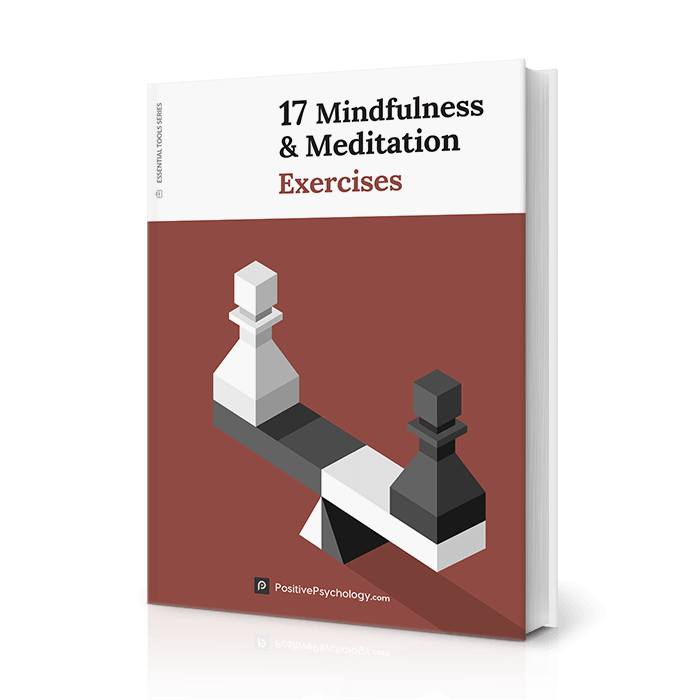




What our readers think
This is a one-stop article to understand all that you ever wondered about Positive Affirmation. Very well organized and there is a flow to the reading. There is so much to take away from this one article.
Kudos to the writer! Keep the great work going!
Under the subtitle “Look at the Research”, the author of this article just copied and pasted the whole paragraph from the “EDU World a multidisciplinary international peer reviewed/refereed journal”, written by Minakshi Rana. And she did not include that in her references. She only cited the research article, but those are not her own words… I wonder how many other things from this article were plagiarism…
Good day Alecsia,
Thank you for bringing this to our attention.
Regards,
Annelé
You forgot to include your citation of 1. (Epton & Harris, 2008) in your references.
Hi there,
Good spotting! I can see this one was missing from our reference list. Here are the details:
Epton, T., & Harris, P. R. (2008). Self-affirmation promotes health behavior change. Health Psychology, 27(6), 746-752.
We have also added it to our post reference.
Kind regards,
Julia | Community Manger
I was really encouraged as I looked for resource to share. I mentioned “Positive Affirmations” to someone that I was encouraging and they asked what that was.
So I’m sending this abundant resource which is so insightful to me. I really appreciate your more than adequate presentation.
Rev. Alvin Franklin
Great article, I love the way you write – thank you. I can’t wait to share this with my work colleagues.
Love yourself and give yourself a hug and pat on the back for all you have done daily.
can u please help me . i eat medicine daily for anxiety and panic attack
Hi Anu,
I’m sorry that you are struggling with anxiety and panic attacks. If you are concerned about your medication (side-effects, etc.), I recommend speaking to your doctor, who may refer you to a psychiatrist to evaluate your dosage and medication. You may also want to consider combining psychiatric support with some form therapy so that you can address the root of your anxiety/panic attacks.
Again, your doctor should be able to connect you to this support.
I hope this helps and best of luck.
– Nicole | Community Manager
Hi. How do you feel about subliminal suggestions that are barely audible on the conscious level but are supposedly heard subconsciously? Can they be effective?